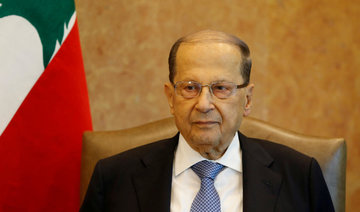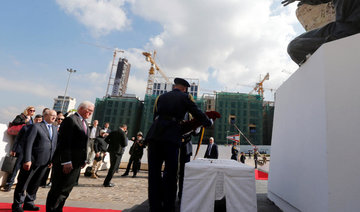BEIRUT: Lebanese President Michel Aoun has renewed his warning against the “dangerous position” taken by Israel’s defense minister on Block 9, in what the president described as the “exclusive economic zone in southern Lebanon.”
Israeli Defense Minister Avigdor Lieberman said on Wednesday that “the gas field in Block 9 is ours by all standards,” describing the Lebanese tender to explore a gas field in the Mediterranean, including Block 9, as “very provocative.”
Israel’s statement came a week before the Lebanese Ministry of Energy celebrated gas exploration contracts signed with a consortium of companies, including French Total, Italian Eni and Russian Novatek, in Block 9 in the south and 4 in the north of the Lebanese economic zone.
In a statement from his press office, Aoun urged “caution to what the Israeli enemy is plotting against Lebanon, especially since there are those who are working at home and abroad to provide a climate which is in harmony with the Israeli threats to attack Lebanon and its right to develop its oil and gas wealth on various pretexts.”
Aoun said: “Lebanon is acting to confront these Israeli allegations by diplomatic means, while reaffirming its right to defend its sovereignty and territorial integrity by all available means.”
In a telephone interview, Lebanese Energy Minister Cesar Abi Khalil said: “Israeli moves are part of an attempt to disrupt the work of the companies and intimidate them, but it will fail and we’ll continue on the path of exploration.”
He added: “Drilling will take place in 2019, and the Israeli threats came on the day after Lebanon moved on this path to use its oil, which disturbed the Israeli enemy.”
Khalil said: “Lieberman’s claim is erroneous. Lebanon demarcated its maritime borders in accordance with international law, and will use all means to protect its oil activities.”
Lebanese Forces leader Samir Geagea said in a statement on Thursday: “Those who believe that the Lebanese government is powerless are wrong. It will take all necessary decisions, and the Lebanese army and the Lebanese people as a whole stand behind it to defend our interests. The issue is not the number of tanks and planes; rather, it is an issue of national rights and international and Arab credibility which is enjoyed by the Lebanese people. (There is) great Arab and international credibility and great sympathy with the Lebanese army.”
The Lebanese Foreign Ministry sent a memorandum to the UN Secretary-General’s office on Jan. 18 about Israeli allegations on the rights of oil Block 9. The memo responded to a letter from the Israeli mission to the Office of the Secretary-General on Dec. 21.
The Office of the Minister of Foreign Affairs published the memorandum, which stated that “the Lebanese Government strongly opposes the Israeli allegations and affirms that Block 9 is entirely located in the special economic zone of Lebanon and requests that reference be made to the geographical coordinates of the maritime economic zone between Lebanon and Occupied Palestine, which were sent by Lebanon to the Office of the Secretary-General on 14 July 2010 and on Oct. 19 2011 and clearly specified that Block 9 is a Lebanese property and is under Lebanese sovereignty. “
The Ministry of Foreign Affairs saw that “Israel ignores our letter sent to the UN on 20 March 2017, which included our unequivocal declaration that Block 9 falls within the Lebanese territorial waters and affirms the right of Lebanon to launch the process of accreditation, exploration, and extraction of oil or gas without prior approval or authorization from any party, and Israel is not entitled to interfere in any way in Lebanon’s exercise of its sovereign rights.”
The State Department warned Israel and its trading partners, including Energean Oil & Gas company, if they decide to take advantage of explorations “in the so-called Israeli field No. 13 and Alon, where the Karish field is located” not to “take advantage of the Lebanese oil or gas through horizontal drilling or in any other way.”
Lebanese president renews warning in gas field dispute with Israel
Lebanese president renews warning in gas field dispute with Israel

Palestinians attempt to use Gaza’s Rafah Border crossing amidst delays

- The Rafah Crossing opened to a few Palestinians in each direction last week, after Israel retrieved the body of the last hostage held in Gaza and several American officials visited Israel to press for the opening
CAIRO: Palestinians on both sides of the crossing between Gaza and Egypt, which opened last week for the first time since 2024, were making their way to the border on Sunday in hopes of crossing, one of the main requirements for the US-backed ceasefire. The opening comes as Prime Minister Benjamin Netanyahu is expected to travel to Washington this week, though the major subject of discussion will be Iran, his office said.
The Rafah Crossing opened to a few Palestinians in each direction last week, after Israel retrieved the body of the last hostage held in Gaza and several American officials visited Israel to press for the opening. Over the first four days of the crossing’s opening, just 36 Palestinians requiring medical care were allowed to leave for Egypt, plus 62 companions, according to United Nations data.
Palestinian officials say nearly 20,000 people in Gaza are seeking to leave for medical care that they say is not available in the war-shattered territory. The few who have succeeded in crossing described delays and allegations of mistreatment by Israeli forces and other groups involved in the crossing, including and an Israeli-backed Palestinian armed group, Abu Shabab.
A group of Palestinian patients and wounded gathered Sunday morning in the courtyard of a Red Crescent hospital in Gaza’s southern city of Khan Younis, before making their way to the Rafah crossing with Egypt for treatment abroad, family members told The Associated Press.
Amjad Abu Jedian, who was injured in the war, was scheduled to leave Gaza for medical treatment on the first day of the crossing’s reopening, but only five patients were allowed to travel that day, his mother, Raja Abu Jedian, said. Abu Jedian was shot by an Israeli sniper while he was building traditional bathrooms in the central Bureij refugee camp in July 2024, she said.
On Saturday, his family received a call from the World Health Organization notifying them that he is included in the group that will travel on Sunday, she said.
“We want them to take care of the patients (during their evacuation),” she said. “We want the Israeli military not to burden them.”
The Israeli defense branch that oversees the operation of the crossing did not immediately confirm the opening.
A group of Palestinians also arrived Sunday morning at the Egyptian side of the Rafah crossing border to return to the Gaza Strip, Egypt’s state-run Al-Qahera News satellite television reported.
Palestinians who returned to Gaza in the first few days of the crossing’s operation described hours of delays and invasive searches by Israeli authorities and an Israeli-backed Palestinian armed group, Abu Shabab. A European Union mission and Palestinian officials run the border crossing, and Israel has its screening facility some distance away.
The crossing was reopened on Feb. 2 as part of a fragile ceasefire deal that stopped the war between Israel and Hamas. Amid confusion around the reopening, the Rafah crossing was closed Friday and Saturday.
The Rafah crossing, an essential lifeline for Palestinians in Gaza, was the only crossing not controlled by Israel prior to the war. Israel seized the Palestinian side of Rafah in May 2024, though traffic through the crossing was heavily restricted even before that.
Restrictions negotiated by Israeli, Egyptian, Palestinian and international officials meant that only 50 people would be allowed to return to Gaza each day and 50 medical patients — along with two companions for each — would be allowed to leave, but far fewer people than expected have crossed in both directions.














